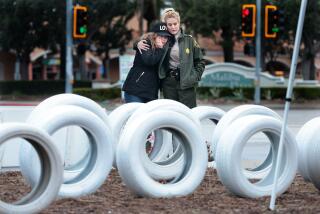Governor Hits the Road to Push Broad Transportation Program
Gov. George Deukmejian, going on the road to promote his transportation program, called Thursday for the construction of new car pool lanes, increased ride-sharing and âinnovativeâ ways to ease traffic congestion.
Deukmejian, speaking in Irvine at the first of five regional conferences on transportation that he is sponsoring, said such steps to improve traffic flow will be needed even with the $2.3-billion highway construction program he proposed earlier this year.
âOur goal is to relieve congestion and speed the flow of people and goods,â the governor said in a luncheon speech. âAdditional construction is necessary, but it isnât the sole solution. We must explore methods to make traffic move more smoothly on our existing freeways.â
Later, Deukmejian told reporters his plan to increase the number of car pool lanes on freeways is different from the disastrous âdiamond laneâ proposal of his predecessor, Gov. Edmund G. Brown Jr. New car pool lanes, Deukmejian said, would be added to existing freeways so that there would be no reduction in the number of lanes available to other motorists, as was the case with the diamond lanes. Furthermore, Deukmejian said, high-occupancy-vehicle lanes would be added only where desired by communities.
The governor also proposed using ânew technologies,â such as road sensors and closed-circuit monitors, to inform motorists of traffic conditions. And he urged local governments and employers to arrange work hours and delivery schedules to reduce traffic congestion during peak hours and to promote ride-sharing.
In addition, he encouraged companies to continue seeking âinnovativeâ solutions, such as turning commuter vans into work stations by equipping them with cellular phones and computers so that workers could better use their time during long commutes.
Deukmejian noted that he recently signed legislation authorizing the construction of toll roads in Orange County parallel to existing freeways in an effort to relieve the regionâs traffic crisis.
Absent from the governorâs speech, however, was any mention of mass transit programs, such as the Metro Rail project.
Last May, in an attempt to address Californiaâs longstanding transportation problems, Deukmejian proposed selling $2.3 billion in bonds to boost the stateâs transportation construction program.
About $1.7 billion of the money would be spent to build new roads or expand existing highways over a five-year period. New car pool lanes in congested areas would be financed with some of this money, Administration officials said.
The remaining fourth of the bond funds--about $575 million--would be turned over to city and county governments to help pay for local transportation projects.
Deukmejianâs plan must win the approval of the Legislature and voters before any bonds can be sold. The bond plan, carried in a bill by Sen. Wadie Deddeh (D-Chula Vista), has been approved by the Senate and sent to the Assembly for action next year.
Deukmejian has consistently opposed increasing the gasoline tax to pay for transportation projects--the stateâs traditional method of financing highway construction.
Instead, he favors using bonds, despite the fact that a substantial amount of the taxpayersâ money would be spent paying the interest on the bonds. Originally, he proposed using 20-year general obligation bonds, which would add about 70 cents to each dollar spent on transportation.
As a way of reducing the interest costs, Deukmejian said he will seek legislative approval to use shorter-term bonds.
The governor told reporters that he believed that using short-term notes would reduce the cost of the bonds to less than 15 cents on the dollar. Later, however, a Deukmejian aide said the amount would actually range from 15 to 25 cents for every dollar spent on highway construction.
In his speech to local government and business leaders, Deukmejian defended his bond proposal, saying: âNotes and bonds helped build California. They are a tried and true method of financing large-scale, public works projects. . . . â
More to Read
Sign up for Essential California
The most important California stories and recommendations in your inbox every morning.
You may occasionally receive promotional content from the Los Angeles Times.










